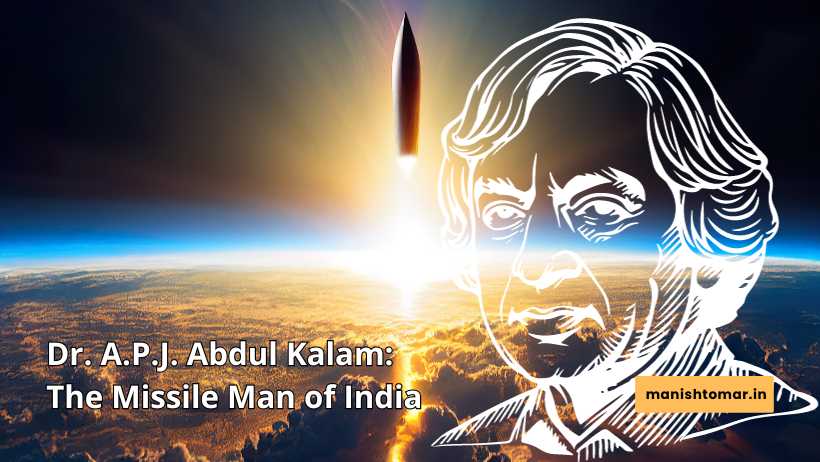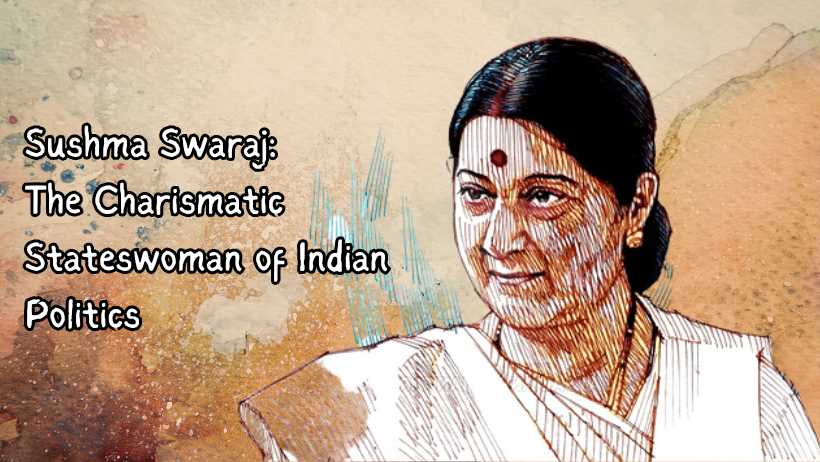- Introduction: The Missile Man of India
- Early Life and Education of Dr APJ Abdul Kalam
- Career of Dr APJ Abdul Kalam
- Contributions to India's Scientific and Technological Advancement: A Visionary Leader's Impact
- Presidency and Legacy: A Guiding Light for Generations
- Conclusion: A Life of Inspiration and Enduring Legacy
Introduction: The Missile Man of India
Dr APJ Abdul Kalam (full name Avul Pakir Jainulabdeen Abdul Kalam), was the epitome of scientific brilliance, unwavering patriotism, and deep-seated humanism. His life, an extraordinary journey from humble beginnings to the pinnacle of scientific achievement, serves as an inspiration to generations.
Born on October 15, 1931, in Rameswaram, Tamil Nadu, India, Kalam’s early life was marked by financial constraints yet an insatiable thirst for knowledge. Despite the challenges, he excelled in his studies and pursued his passion for science, earning him the moniker “Missile Man of India.”
Kalam’s contributions to India’s scientific and technological progress are unparalleled. His pivotal role in the development of India’s first indigenously developed ballistic missile, the Agni, and its first satellite launch vehicle, the SLV-III, cemented his legacy as a pioneering scientist.
Beyond his scientific prowess, Kalam’s leadership extended to the realm of public service. He served as Principal Scientific Advisor to the Government of India from 1992 to 1999 and played a key role in India’s Pokhran-II nuclear tests. In 2002, he was elected as the 11th President of India, gaining immense popularity as the “People’s President” for his humility and unwavering commitment to the nation’s progress.
Kalam’s legacy extends beyond his scientific achievements and political contributions. He was a prolific writer, penning inspiring books like “Wings of Fire: An Autobiography” and “India 2020: A Vision for the New Millennium,” which continue to ignite the aspirations of young minds.
Early Life and Education of Dr APJ Abdul Kalam
From Humble Beginnings to Scientific Excellence
Dr APJ Abdul Kalam’s childhood was marked by humble beginnings, with his father working as a boat owner and imam of a local mosque. Despite financial constraints, Kalam’s family instilled in him a deep appreciation for education and the pursuit of knowledge.
From an early age, Kalam exhibited a remarkable aptitude for learning. He spent countless hours poring over books, fascinated by the wonders of science and mathematics. His passion for learning was evident in his academic performance, consistently excelling in his studies.
After completing his elementary education at Schwartz Higher Secondary School in Ramanathapuram, Kalam pursued his higher education at Saint Joseph’s College in Tiruchirappalli, graduating with a degree in physics in 1954. His academic achievements opened doors to further opportunities, leading him to the prestigious Madras Institute of Technology (MIT) in Chennai, where he earned a degree in aerospace engineering in 1957.
Kalam’s passion for science and engineering was not merely academic; it was deeply rooted in a desire to make a positive impact on the world. He envisioned a future where India could stand tall as a scientific power, contributing to the betterment of its citizens and the world at large.
The foundation of Kalam’s remarkable career was laid during his early life and education. His humble beginnings, unwavering passion for learning, and academic excellence set the stage for his extraordinary journey as a scientist, engineer, and national leader.
Career of Dr APJ Abdul Kalam
A great Scientist and Engineer: Shaping India’s Scientific Landscape
In 1954, Dr. A.P.J. Abdul Kalam embarked on his illustrious career as a scientist by joining the Defense Research and Development Organization (DRDO), where he played a pivotal role in shaping India’s scientific and technological trajectory. His contributions to the nation’s missile development program were nothing short of extraordinary.
Kalam’s expertise in aerospace engineering and aeronautics was instrumental in the development of India’s first indigenously developed ballistic missile, the Agni, and its first satellite launch vehicle, the SLV-III. These achievements catapulted Kalam into the national spotlight, earning him the well-deserved title of “Missile Man of India.”
Under Kalam’s leadership, the DRDO transformed into a hub of scientific innovation, making significant advancements in missile technology and defense systems. His dedication to research and development laid the foundation for India’s self-reliance in strategic defense capabilities.
Kalam’s impact extended beyond missile development. He made significant contributions to India’s space program, playing a crucial role in the development of satellites and launch vehicles. His expertise in aerospace engineering was instrumental in expanding India’s presence in the realm of space exploration.
Throughout his career as a scientist and engineer, Kalam demonstrated an unwavering commitment to scientific progress and technological innovation. His contributions to India’s defense and space programs have left an indelible mark on the nation’s scientific landscape. His legacy as a pioneering scientist and engineer continues to inspire generations of scientists and engineers to pursue excellence in their fields.
Contributions to India’s Scientific and Technological Advancement: A Visionary Leader’s Impact
Dr APJ Abdul Kalam’s contributions to India’s scientific and technological advancement extended far beyond his groundbreaking work in missile development. His leadership, vision, and unwavering commitment to scientific progress left an indelible mark on the nation’s scientific landscape.
Role as Principal Scientific Advisor to the Government of India
In 1992, Dr APJ Abdul Kalam was appointed as the Principal Scientific Advisor to the Government of India, a position he held until 1999. In this role, he played a pivotal role in shaping India’s scientific and technological policies, providing expert guidance and vision to the nation’s scientific endeavors.
Kalam’s tenure as Principal Scientific Advisor was marked by a number of significant achievements, including:
- Promoting scientific research and innovation in critical areas such as aerospace, defense, and information technology.
- Fostering collaboration between academia, industry, and government to accelerate technological advancements.
- Establishing new research institutes and centers of excellence to nurture scientific talent.
- Overseeing the development of India’s nuclear program and its successful nuclear tests in 1998, which propelled India into the nuclear-capable nations.
Kalam’s leadership as Principal Scientific Advisor was instrumental in steering India towards a future of scientific and technological progress. His vision and commitment to innovation laid the foundation for India’s emergence as a global player in the scientific arena.
Involvement in India’s Pokhran-II nuclear tests in 1998
The Pokhran-II nuclear tests in 1998 were a significant milestone in India’s technological advancement. Kalam, as Principal Scientific Advisor, played a crucial role in overseeing the development and execution of the tests, demonstrating India’s nuclear capability to the world.
While the tests were met with international criticism, they also served as a testament to India’s scientific prowess and its ability to safeguard its national interests. Kalam’s involvement in the Pokhran-II tests solidified his reputation as a leading scientist and a visionary thinker.
Promotion of scientific research and technological innovation
Throughout his career, Dr APJ Abdul Kalam was a staunch advocate for scientific research and technological innovation. He believed that science and technology held the key to India’s progress and development, and he tirelessly championed the cause of promoting these fields.
Kalam’s efforts to promote scientific research and innovation included:
- Establishing educational institutions and research centers to nurture scientific talent.
- Encouraging scientific collaboration between India and other nations.
- Advocating for increased government funding for scientific research.
- Inspiring young minds to pursue careers in science and technology.
Kalam’s unwavering belief in the power of science and technology continues to inspire generations of scientists, engineers, and innovators to push the boundaries of knowledge and contribute to India’s scientific progress.
Dr APJ Abdul Kalam’s contributions to India’s scientific and technological advancement were unparalleled. His leadership, vision, and unwavering commitment to scientific progress transformed India’s scientific landscape, leaving an enduring legacy that continues to shape the nation’s scientific journey.
Presidency and Legacy: A Guiding Light for Generations
In 2002, Dr APJ Abdul Kalam embarked on a new chapter in his extraordinary journey when he was elected as the 11th President of India. His presidency was marked by his humility, dedication to public service, and unwavering commitment to the betterment of the nation.
The “People’s President”
Kalam’s presidency was characterized by a deep connection with the people of India. He was fondly remembered as the “People’s President” for his humility, accessibility, and genuine concern for the welfare of the nation’s citizens.
His down-to-earth demeanor and unwavering commitment to public service resonated with people from all walks of life. He frequently visited schools, colleges, and villages, engaging with students, youth, and community members, inspiring them with his words of wisdom and encouragement.
Champion of Education, Youth Empowerment, and National Development
Kalam’s presidency was marked by a strong focus on education, youth empowerment, and national development. He believed that education was the key to unlocking the potential of India’s youth and driving the nation’s progress.
He actively promoted educational initiatives, advocating for increased funding for education, improving infrastructure, and enhancing the quality of teaching. He also championed programs aimed at empowering youth, encouraging them to participate in nation-building activities and contribute to the country’s development.
Kalam’s vision for India’s future was outlined in his book “India 2020: A Vision for the New Millennium.” In this visionary work, he painted a picture of a developed India, a nation leading the world in technological advancements, economic prosperity, and social harmony.
Inspiring Author and Legacy
Beyond his scientific and political achievements, Kalam was also a prolific writer, penning several inspiring books that continue to motivate and inspire generations of readers. His most well-known work, “Wings of Fire: An Autobiography,” recounts his remarkable journey from humble beginnings to the pinnacle of scientific achievement.
Kalam’s books are filled with messages of hope, perseverance, and the power of dreams. They encourage readers to believe in themselves, pursue their aspirations with unwavering determination, and contribute to the betterment of society.
When Dr. A.P.J. Abdul Kalam passed away on July 27, 2015, India lost not just a scientist, a leader, or a president but a beacon of hope and inspiration. His legacy lives on in the countless lives he touched, the minds he ignited, and the nation he helped shape.
His unwavering belief in the power of knowledge, his humility, and his unwavering commitment to the betterment of India continue to inspire generations to dream big, work hard, and contribute to the making of a better world.
Official information on Dr Kalam
Conclusion: A Life of Inspiration and Enduring Legacy
Dr. A.P.J. Abdul Kalam, the “Missile Man of India,” was an extraordinary individual whose life and achievements continue to inspire generations. From his humble beginnings to the pinnacle of scientific and political prominence, Kalam’s journey epitomizes the power of perseverance, dedication, and an unwavering belief in one’s dreams.
His contributions to India’s scientific and technological advancement were unparalleled. His leadership in the development of India’s missile and space programs transformed the nation’s scientific landscape, making it a global player in the realm of technology.
Beyond his scientific prowess, Kalam’s impact extended to the realm of public service. His tenure as Principal Scientific Advisor and his presidency of India were marked by his vision, humility, and unwavering commitment to the nation’s progress.
Kalam’s legacy extends beyond his tangible achievements. He was a prolific writer, inspiring countless young minds through his books, including his autobiography “Wings of Fire.” His words of wisdom and encouragement continue to resonate with people of all ages, reminding them of the power of dreams and the importance of striving for excellence.
When Dr. A.P.J. Abdul Kalam passed away in 2015, India lost not just a scientist, engineer, and president but a beacon of hope, a role model, and a national inspiration. His life, an extraordinary testament to the human spirit, continues to motivate generations to pursue their dreams and contribute to the betterment of society.
Kalam’s legacy is not merely one of scientific brilliance or political accomplishment; it is a legacy of humanism, compassion, and unwavering belief in the potential of every individual. His life serves as a reminder that regardless of background or circumstances, anyone can achieve extraordinary things through hard work, perseverance, and a deep-seated commitment to making a positive impact on the world.
In conclusion, Dr. A.P.J. Abdul Kalam’s life and achievements stand as a testament to the power of human potential. His legacy continues to inspire generations to dream big, work hard, and make a positive impact on the world.
You might be interested in: Narendra Modi: A Leader Shaping India’s Destiny
Keywords: Dr. A.P.J. Abdul Kalam, Missile Man of India, Scientist, Engineer, President of India, Agni missile, SLV-III, Pokhran-II, Wings of Fire, India 2020




